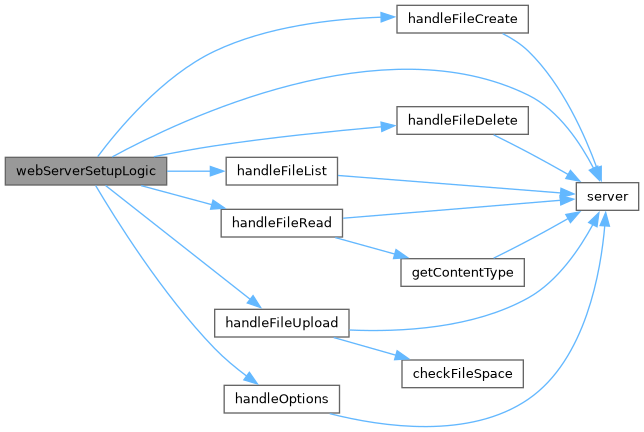Functions | |
| bool | checkFileSpace (size_t fileSize) |
| String | formatBytes (size_t bytes) |
| String | getContentType (String filename) |
| void | handleOptions () |
| Handles CORS preflight (OPTIONS) requests. | |
| void | handleFileRead () |
| Handles file read requests from the server. | |
| void | handleFileUpload () |
| Handles file uploads to LittleFS File System. | |
| void | handleFileDelete () |
| Handles file deletion requests to the server. | |
| void | handleFileCreate () |
| Handles file creation requests to the server. | |
| void | handleFileList () |
| void | webServerSetupLogic (String router, String pass) |
| Sets up the web server with routes for handling file operations, settings, and LED control. | |
Function Documentation
◆ checkFileSpace()
| bool checkFileSpace | ( | size_t | fileSize | ) |
References maxPX.
Referenced by handleFileUpload().

◆ formatBytes()
| String formatBytes | ( | size_t | bytes | ) |
◆ getContentType()
| String getContentType | ( | String | filename | ) |
References server().
Referenced by handleFileRead().


◆ handleFileCreate()
| void handleFileCreate | ( | ) |
Handles file creation requests to the server.
Manages the file creation process, including:
- Checking for valid request arguments (at least one argument required)
- Verifying the file path is not the root directory ("/") to prevent accidental creation
- Checking if the file already exists using LittleFS.exists()
- Creating the file using LittleFS.open() in write mode ("w")
- Closing the file after creation
- Returning a 200 response on successful creation
- Returning error responses for:
- Invalid requests (500, "BAD ARGS")
- Bad paths (500, "BAD PATH")
- File existence (500, "FILE EXISTS")
- Creation failure (500, "CREATE FAILED")
- Note
- This function is not used at all in SmartPoi file uploading. todo: delete?
- This function is called by the server to handle file creation requests.
- Supports CORS requests and sends the necessary headers to allow cross-origin requests.
References server().
Referenced by webServerSetupLogic().


◆ handleFileDelete()
| void handleFileDelete | ( | ) |
Handles file deletion requests to the server.
Manages the file deletion process, including:
- Checking for valid request arguments (at least one argument required)
- Verifying the file path is not the root directory ("/") to prevent accidental deletion
- Checking if the file exists before deletion using LittleFS
- Deleting the file using LittleFS.remove()
- Returning a 200 response on successful deletion
- Returning error responses for:
- Invalid requests (500, "BAD ARGS")
- Bad paths (500, "BAD PATH")
- File not found (404, "FileNotFound")
- Note
- This function is called by the server to handle file deletion requests.
- Supports CORS requests and sends the necessary headers to allow cross-origin requests.
References server().
Referenced by webServerSetupLogic().


◆ handleFileList()
| void handleFileList | ( | ) |
References server().
Referenced by webServerSetupLogic().


◆ handleFileRead()
| void handleFileRead | ( | ) |
Handles file read requests from the server.
Sends the requested file to the client with the appropriate headers. Supports CORS requests and sends the necessary headers to allow cross-origin requests.
- Note
- This function is used to handle file read requests from the server.
-
Sends the following headers:
- Access-Control-Allow-Origin: * (allows requests from all origins)
- Access-Control-Allow-Methods: GET, POST, PUT, DELETE, OPTIONS, FETCH (allows multiple methods)
- Access-Control-Allow-Headers: Content-Type (allows Content-Type header in requests)
- Access-Control-Allow-Credentials: true (allows credentials in requests)
- Returns a 500 error if no file argument is provided.
- Returns a 404 error if the file is not found.
- Uses LittleFS to read the file from storage.
References getContentType(), and server().
Referenced by webServerSetupLogic().


◆ handleFileUpload()
| void handleFileUpload | ( | ) |
Handles file uploads to LittleFS File System.
Manages the file upload process, including:
- Checking for valid filenames (single character present in images string)
- Tracking file size and checking against maximum allowed size (checkFileSpace())
- Writing data to the file (if within size limits)
- Handling upload completion, abortion, and errors
- Note
- This function is called by the ESP8266 server to handle file uploads.
- Supports CORS requests and sends the necessary headers to allow cross-origin requests.
- Uses LittleFS to read and write files.
References checkFileSpace(), fsUploadFile, images, maxPX, server(), and uploadCounter.
Referenced by webServerSetupLogic().


◆ handleOptions()
| void handleOptions | ( | ) |
Handles CORS preflight (OPTIONS) requests.
Sends the necessary headers to respond to CORS preflight requests. This allows cross-origin requests from web applications.
- Note
- This function is used to handle CORS preflight requests.
-
Sends the following headers:
- Access-Control-Allow-Origin: * (allows requests from all origins)
- Access-Control-Allow-Methods: GET, POST, OPTIONS (allows GET, POST, and OPTIONS methods)
- Access-Control-Allow-Headers: Content-Type (allows Content-Type header in requests)
- Returns a 204 No Content response to indicate successful preflight.
References server().
Referenced by webServerSetupLogic().


◆ webServerSetupLogic()
| void webServerSetupLogic | ( | String | router, |
| String | pass ) |
Sets up the web server with routes for handling file operations, settings, and LED control.
Initializes the web server with routes for:
- Handling file operations:
- Listing files (GET /list)
- Reading files (GET /edit)
- Creating files (PUT /edit)
- Deleting files (DELETE /edit)
- Managing settings:
- Router setting (GET /router)
- Pattern setting (GET /pattern)
- Interval setting (GET /intervalChange)
- Brightness setting (GET /brightness)
- Controlling LED behavior
- Parameters
-
router The router setting to use pass The password to use
- Note
- This function sets up the web server and its routes, but does not start the server.
References addrNumA, addrNumB, addrNumC, addrNumD, content, handleFileCreate(), handleFileDelete(), handleFileList(), handleFileRead(), handleFileUpload(), handleOptions(), interval, newBrightness, pattern, patternChooser, responseHTML, routerOption, server(), settings, and statusCode.
Referenced by littleFSLoadSettings().


Generated by